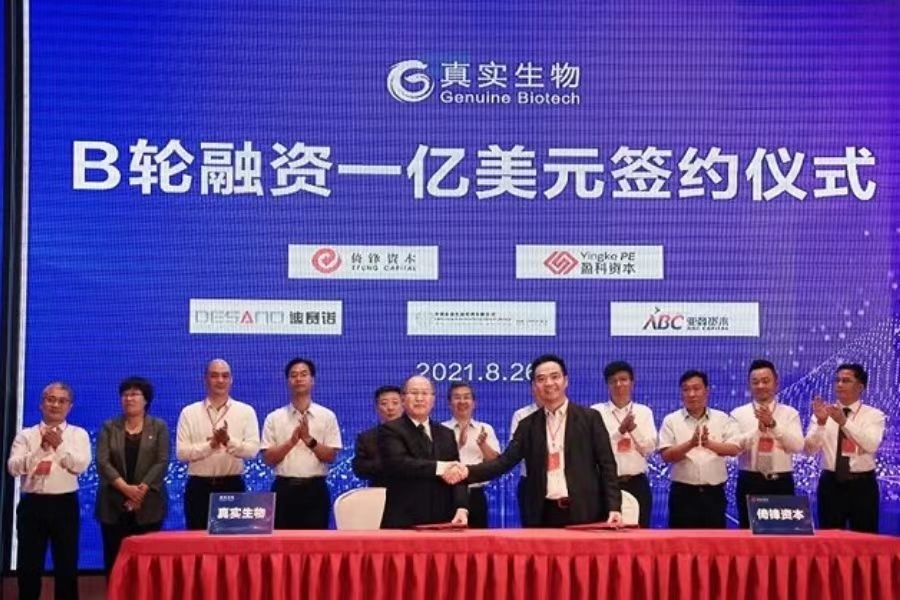Genuine Biotech Seeks IPO Booster from New Oral Covid Drug

Company hopes China’s approval of its small molecule oral Covid-19 drug will draw investors to its newly filed listing plan
Key Takeaways:
- Genuine Biotech has filed to list in Hong Kong, planning to raise funds to commercialize its newly approved oral Covid drug
- The company’s Azvudine is the first domestically developed oral Covid-19 drug approved for China, though some still question its effectiveness
By Molly Wen
A little-known drug maker named Genuine Biotech Ltd. wants to strike while the iron is hot, and is rushing to sell investors on its dream of becoming a new rags-to-riches story. That’s the hope, at least, after the company received a conditional regulatory green light on July 25 to sell Azvudine, China’s first self-developed small molecule oral drug for Covid-19 treatment.
Just 10 days later, Genuine Biotech filed for a Hong Kong IPO. Adding to the momentum, China’s National Health Commission announced on Aug. 9 that Azvudine had been included among its latest antiviral treatments for Covid, further clearing the way for its commercialization.
Oral Covid-19 drugs are quickly becoming an important tool to combat the virus, according to Southwest Securities, which estimates sales of such drugs could be worth up to nearly $10 billion worldwide annually. With that kind of money on the line, it’s no wonder more than a dozen Chinese pharma companies are actively trying to develop such drugs, eager for a piece of the pie. Still, Genuine Biotech was a relative dark horse in the race to make China’s first domestically-developed Covid drug.
Genuine Biotech’s very establishment was all about Azvudine, according to its prospectus. The spectral antiviral drug was initially developed by a team from Zhengzhou University in central China’s Henan province. Local businessman Wang Zhaoyang acquired the rights to the drug in 2011, long before the pandemic, and established Genuine Biotech in 2012 as the entity to develop and commercialize it.
Wang has stepped down as Genuine Biotech’s chairman, but is still the company’s controlling shareholder. He sits astride a far more diverse business empire, covering industries running the range from mining to auctions, real estate and tourism.
Azvudine didn’t start out as a Covid drug, and instead received conditional approval for the treatment of HIV in July 2021 before getting its Covid green-light a year later. But the drug has yet to be commercialized for either application, which explains why the company’s financial statements look like a sea of red ink filled with zero revenue and plenty of losses.
The company lost 151 million yuan ($22.4 million) in 2020, and another 197 million yuan last year, and saw its R&D spending grow by seven times to 114 million yuan over that time. The losses kept growing in the first five months of this year, ballooning by 220% to 218 million yuan from the year-earlier period.
Thin pipeline
Azvudine aside, potential investors in Genuine Biotech shouldn’t expect too much too soon. The company has only one other product in the clinical stages of development, a treatment for non-small-cell carcinoma. It has seven other treatments in the pipeline, all in the pre-clinical stage, meaning it could be years before they make any revenue, if ever.
Accordingly, anyone investing in the company should only be betting on Azvudine for the near-term. The prospectus shows the company has capacity to produce about 1 billion Azvudine tablets annually and is fully prepared to start commercial sales. The funds from the Hong Kong IPO would mainly be used for that commercialization effort.
Genuine Biotech has also found a strong partner in Fosun Pharma (2196.HK; 600196.SH), awarding it exclusive rights to sell, market, distribute and export Azvudine. Genuine Biotech will oversee the drug’s production in China and supply its active ingredient abroad.
The tie-up will also bring Genuine Biotech some much-needed cash, in the form of 800 million yuan in stages from Fosun Pharma, which also has agreed to cover any clinical trial costs for Azvudine going forward. In terms of profit sharing, the two partners will divide gross profits from domestic Azvudine sales 50-50 or 55-45, depending on the sales channel.
The price of Azvudine tablets for Covid-19 treatment was initially set at less than 300 yuan per bottle of 35 tablets, representing one course of treatment. China’s other approved oral drug for Covid-19, the imported Paxlovid from U.S. drug maker Pfizer (PFE.US), costs about 2,300 yuan for each course of treatment, giving Azvudine a huge price advantage.
But Genuine Biotech is hardly alone in the race among its domestic peers to develop Covid drugs, with more than a dozen other Chinese companies also developing their own oral products. That field could quickly provide new competition from better-known names like Kintor Pharmaceutical (9939.HK), Shanghai Junshi Biosciences (1877.HK; 688180.SH), Simcere Pharmaceutical (2096.HK) and Everest Medicines (1952.HK). Among that group, Junshi Biosciences’ JVV116 candidate and Kintor Pharma’s Proxalutamide are both close on Genuine Biotech’s heels, both having completed Phase 3 clinical trials.
A research report from AVIC Securities points out that the growing prevalence of the faster spreading and more pathogenic Omicron BA.4 and BA.5 strains means the Covid-19 pandemic is still characterized by recurrence and high uncertainty, creating promising demand for targeted oral drugs. Faced with the potentially imminent arrival of these and other newcomers, Genuine Biotech will need to seize its head start to grab market share ahead of the others.
Clinical data questioned
Despite its status as the first approved domestically-developed oral drug for Covid-19, some still have questions Azvudine’s clinical trial data. According to Genuine Biotech’s prospectus, Azvudine can reduce the viral load and relieve clinical symptoms in 40% of patients after seven days of treatment.
Some industry professionals believe that the primary endpoint of the phase 3 clinical trial, described as “improvement of clinical symptoms,” is highly subjective and inconsistent with the clearer reduction in “incidence of critical illness or mortality” recommended by drug regulators. What’s more, they note that Azvudine has been in phase 3 clinical trials since June 2020. The company claims that period covers the main Covid-19 variants, but has not disclosed the exact strains targeted for its efficacy conclusions.
Genuine Biotech completed two rounds of financing in 2021 and 2022, and was valued at about 3.56 billion yuan after its Series-B financing in April this year. The lack of detailed information for this IPO, coupled with the absence of revenue, make it difficult to calculate a post-IPO valuation for now.
But we can still consider two other Hong Kong-listed money-losing biotech companies with oral Covid drugs in the pipeline, Kintor and Brii Biosciences (2137.HK), which have market caps of HK$5 billion ($637 million) and HK$5.9 billion, respectively. Genuine Biotech could be somewhere in that ballpark, though its firmer commercialization prospects for Azvudine could earn it a premium over those two peers.
To subscribe to Bamboo Works weekly free newsletter, click here






